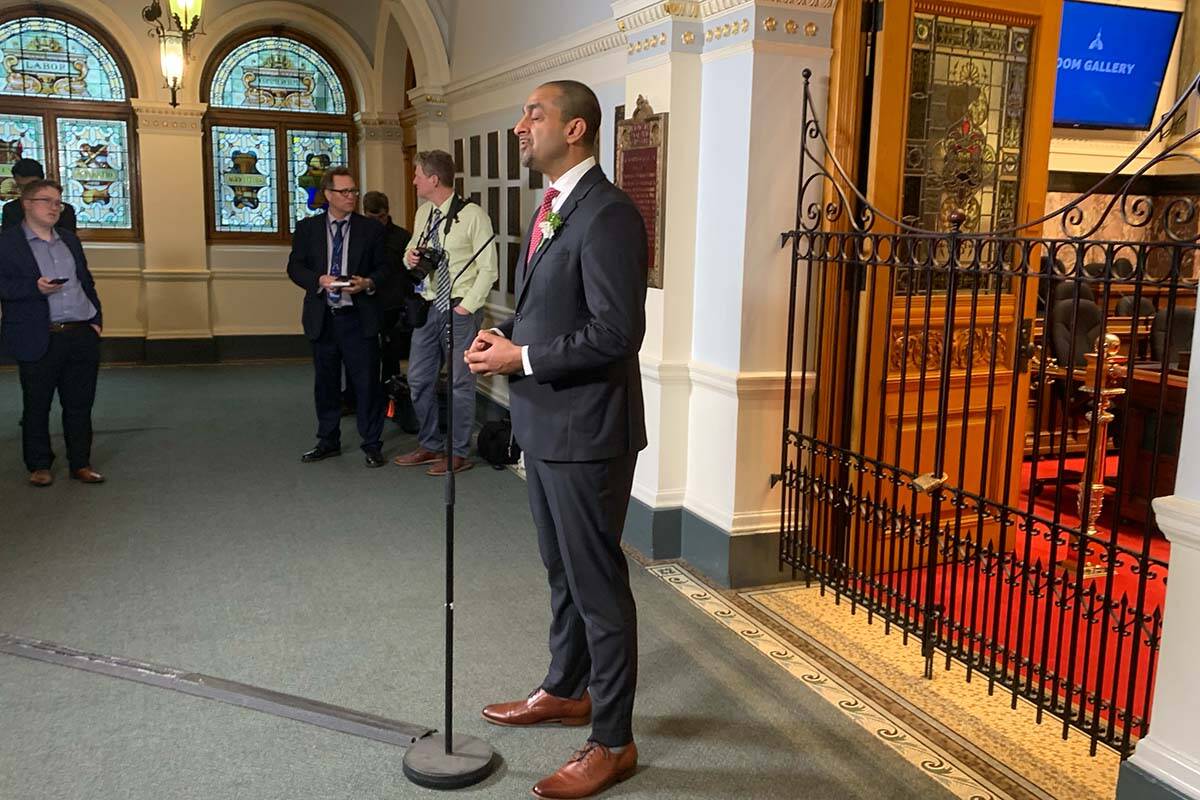Opposition parties gave the first Throne Speech of Premier David Eby’s government a thumbs-down even before they had read it, while others offered some praise in its wake.
Lt. Gov. Janet Austin said in the Throne Speech delivered Monday afternoon that the government would put this year’s surplus to work because it might not be there next year in the face of economic challenges and changes.
Last year, the government revealed that B.C. has a budget surplus of $5.7 billion and any money not spent before March 31 would go toward the provincial debt.
The government’s signal to tap into the surplus didn’t sit well with Official Opposition Leader Kevin Falcon, of the BC Liberals, who attacked it during a news conference almost three hours before the speech dropped.
“I would argue that is very irresponsible,” Falcon said. “You can see that by the announcements that they have made that have no detail, that have not been very well-thought-out, and I can tell you as a former finance minister, if you spend that much time in that short period of time, it does not end well.”
BC Greens Leader Sonia Furstenau struck a similar note.
While the speech presents what she called a “slightly more honest assessment of the challenges” facing B.C., it reflected past accomplishments more than setting out a vision.
“What we needed to hear from the BC NDP government is how they are going to measure success,” Furstenau said.
“It’s not about measuring construction starts, but how many fewer people are homeless or precariously housed. It’s not about how much money it has invested in healthcare, but how many more people are attached to a family doctor.”
RELATED: B.C. government to make heavy use of spending surplus: Throne Speech
Housing Minister Ravi Kahlon defended the government’s spending choices. While he deferred specific questions about the budget, he said British Columbians have made it clear that they want support from the government now.
“We need to make sure that people get those supports,” he said.
University of Victoria associate economics professor Paul Schure said planning to spend the money now when a downturn looms is smart policy.
If spent wisely, the spending will absolutely help, he added.
“Most British Columbians agree that there are certain alarming issues that require immediate attention,” Schur said. “The throne speech did outline budget priorities, but lacked detail on how the money would be spent…(there) has clearly been some careful thinking regarding some priority areas.”
Schure added B.C. has a low debt-to-GDP ratio and is far from being in any financial danger. B.C. initially foresaw a budget deficit of over $5 billion, now it is looking at a budgetary surplus of over $5 billion, Schur said.
“This is a quite drastic improvement,” he said.
University of the Fraser Valley political science professor Hamish Telford said the speech struck the right tone in acknowledging the difficult times facing B.C.
“Like most speeches, it was maddeningly vague,” Telford said, adding that it repeated many past announcements and actions, including the government’s decision to stop charge bridge tolls, something done six years ago.
The public will have to wait until the budget later this month to get a true sense of what the government wants to do, he added.
One thing is clear: British Columbians likely won’t have a snap election in the fall, because the government plans to table new legislation in the spring and the fall, including for housing.
Ideally, new housing legislation would come forward sooner, Telford said, adding that Eby has made housing a priority.
Kahlon said the affordable housing files are ongoing. Several initiatives are already underway and additional measures will come forward later this year.
“We want to make sure that we do things thoughtfully, we want to make sure that we are able to consult mayors, local government, the development community, the not-for-profit community.”
He added that government has already been talking with those groups and staff are currently analyzing data prior to revealing the first eight to 10 municipalities that would fall under the Housing Supply Act. That act establishes new housing targets for municipalities and could see the province step in if those municipalities have not pulled their weight.
@wolfgangdepner
wolfgang.depner@blackpress.ca
Like us on Facebook and follow us on Twitter.

